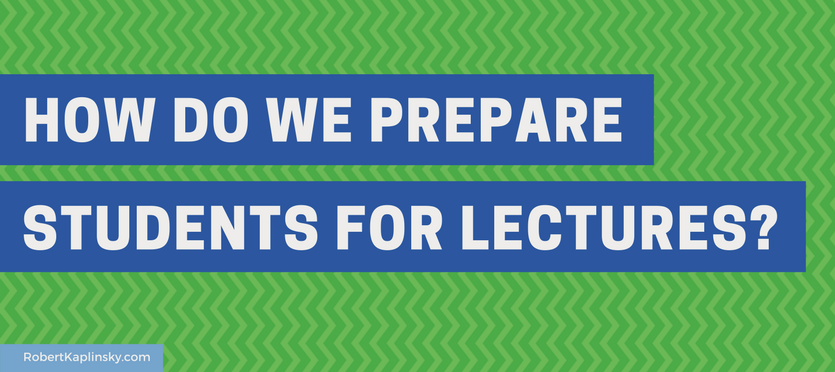Have you ever heard someone say that teachers need to lecture more to students in middle or high school so they are prepared for being lectured to in college? I have and I’m guessing that you have too. While I think that people who say this mean well, I think that this belief is misguided at best.
How many people look back at their college lectures and remember them as being the time they best understood what they learned? If you also felt that lectures were a challenging way to learn, why would we want to do more of it?
I asked people on Twitter what they thought about this:
Random vent: I am not a fan of the argument that b/c students will be lectured to in college, we should prepare them by lecturing in HS & MS
— Robert Kaplinsky (@robertkaplinsky) October 31, 2017
You can click on the tweet above to read some of their responses and I’ve shared a few of my favorite below:
A better strategy would be to teach college and university 'lecturers' better pedagogical practices
— Kelly Bairos (@kellybairos) October 31, 2017
One of the most difficult things for me is to go from my math methods class taught which is discussion based to my stat lecture.
— Ms. Cromer (@carmencromer12) October 31, 2017
“Let’s ignore best practices and make sub-par instructional decisions to match subpar instruction they might get in college.”🙄🙄🙄
— Jack Leonard (@JackLeonardEdu) October 31, 2017
Even as an adult, sitting in a full day session of sit & get doesn’t better prepare me for the next time I’m in this same scenario.
— Matt Sanders (@mr_sanders78) October 31, 2017
I’m not saying that there is never a place for lecture. Rather I believe we should be thinking of ways to do less lecture at all levels (including college) rather than acclimate students to it. While universities are held in high esteem, many of the professors who work there are primarily interested in research and have little training in education.
If educators hate to be lectured to in professional development, why should we subject students to it? Might students be better off if we took a more balanced approach so that they had more opportunities to experience and interact with mathematics rather than sitting and listening to it? Is it possible that the best thing we could do to prepare them is actually lecture as little as possible and instead spend more time on discovery, discussions, and active learning?
What do you think? Please let me know in the comments below.


I really get upset when I am told to lecture more, have them take notes, give more paper and pencil tests and at least an hour of math homework because that is what they will do in high school. My middle school students learn through hands-on exploration of concepts. They are learning to THINK. That is what they will need in the future.
Yup. Everything you just said. In too many ways, we’ve lost perspective about what we’re really after in mathematics.
There is a movement in higher Ed to make learning more active, inquiry, and problem based to follow research based practices better. While it’s slower in some ways to gain traction than at K12 level since there is a focus on research, we’ll get there eventually as more and more students who have experienced this type of learning environment become professors.
Wow. It will be amazing to see what comes of this. I wonder if a shift will be noticeable in my lifetime.
I get a similar argument when I advocate for universally designing instruction and assessments to get a more accurate read on what students CAN do instead of what they CANNOT. Pretty much every educator I meet can agree that the state summative assessment is not a good measure of student ability and most educators, parents and students alike are not fans. So the argument that we should “teach to the test” when the test is a poor measure baffles me. We should engage students in authentic learning experiences to help them make the transfer to long term memory and have valuable memories, experiences and knowledge to pull from when they go to take a terrible standardized assessment. We do not teach “crappy” to prepare students for a “crappy” test. Likewise we do not teach in a way that is not instructionally sound (lecture) to prepare them for future poor instruction.
I love all of this, Naomi. Great points. Nothing I’d change or add.